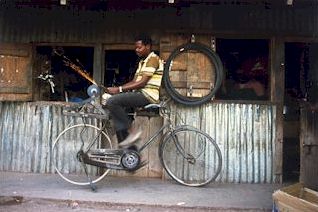4. Stage (May / June 1990): Lome (Togo) - Benin City (Nigeria)
It wasn't easy for me to leave Lome again. Too tempting was the easy life in this attractive city, with days spent between hotel, swimming pool, beach, supermarket and disco. The constant warnings of attacks on the Nigerian roads further diminishes my enthusiasm.
I make my way back to Benin along the coast in an easterly direction, finally being able to make use of the well deserved back wind. Well worth a visit here are the lake dwellings, which can only be reached by canoe, situated in the lagoon of Cotonou, the main harbor of the country.
Two days later I cross the border to Nigeriawithout any difficulty; the local currency obtained on the black market of Lome for a good price, is safely hidden in the bicycle frame below the saddle once again. I have learn't that a short standard revision of my travels is generally enough to get me off the hook. Incredulous Border post, customs, and police officers along the road let me pass without the usual financial blackmail.
 |
|
However, my smooth ride comes to an abrupt halt in the city of Lagos , the Capital. The 12 hour traffic jam that I find myself in, only ever clears up at night, when it simply becomes to dangerous and no one dares to set foot outside. Crime has skyrocketed due to the growing oil industry, which has immensely widened the gap between rich and poor. I am stunned by the ugliness of the city, it's stench and its muddy, littered and polluted streets. Via a system of high bridges I enter the city center where I weave my way through the stagnant traffic, with one eye always on my luggage and constantly having to fight off the hoards of hawkers that are desperate to make a sale. Anything from fake Rolex watches, kitchen clocks, blow-up-globes to toilet paper can be bought here. A 3- hour long downpour turns Lagos city into Venice. Floods are the order of the day and, in fact, life proceeds "as usual". Shoes and briefcases balanced on their heads, businessmen wade through muddy water that stands knee high to reach their workplace. Looking down at my feet, I even see little fish. It is incredible! At the post office the counters are strategically positioned in order for business to be able to continue and I get to collect my post. Before fleeing this witches cauldron, I rush to the Embassy of Cameroon where, on presenting the secretary with an official, but totally unrelated, German document, I am issued a visa, no questions asked. I heed the warnings of locals against ridding at night, which, at daily temperatures averaging 30 °C, have become superfluous anyway. The freeway like road now leads through marshy rainforests past little villages that appear in clearings every 30 to 40 kms. I am lucky and always find shelter, sometimes with hospitable locals but; I am also taken in by white immigrants, who live and work in Nigeria. At one stage malaria gets the better of me and one look into the local doctor's room is enough for me to refuse treatment. Luckily again, I am offered to share the home of a wealthy Lebanese Nigerian, so I get to recover in the comfort of an air-conditioned mansion. After a few days of enjoying the good Lebanese cuisine I am back on my feet again, ready to hit the road. Yet another uneasy incident, when I try to report having seen a human corpse floating in one of the many rivers I cross in the southern part of Nigeria, I am urged not to do so. "One invariably becomes caught-up in the whole thing," they tell me. So, I soon realize that there is a different value system applied to things like a human life, time, distance and also direction in these parts of the world. More and more often now I am told about another German cyclist who's stories are making their rounds along my route and I'm wondering whether it isn't my own story which I am being told.
To download page Beginning of page Next page
